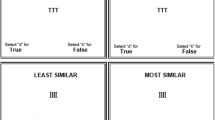Abstract
Relational Frame Theory (RFT) views derived relational responding as an overarching operant class of behavior. One approach to the analysis of derived relations from the RFT perspective, therefore, would be to examine systematically the effects of differential consequences on derived responding. In Experiment 1, 15 undergraduate subjects were divided into three conditions (5 subjects in each condition). In each condition subjects were exposed to 11 sessions, and in each session they were trained and tested for the formation of combinatorially entailed relations. In Condition 1, no differential consequences were delivered after any session. In Condition 2, responseindependent, positive feedback was delivered after each of the first five sessions (i.e., the experimenter said to the subject “You are doing very well”) and response-independent, negative feedback was delivered after Sessions 6 to 10 (i.e., the experimenter said to the subject “You are doing badly”). Condition 3 was similar to Condition 2, except that the first five sessions were followed by negative feedback and the remaining sessions were followed by positive feedback. The results showed that (a) delivering positive feedback before negative feedback attenuated relational responding relative to the negative before positive feedback condition, and (b) delivering differential feedback produced more frequent relational responding relative to the nofeedback condition. Experiment 2 replicated Conditions 2 and 3 of Experiment 1, except that the positive and negative feedback was replaced by accurate and inaccurate feedback, respectively. During accurate feedback, subjects were told “You’re doing well” if responding was above 50% correct and were told “You’re doing badly” if responding was less than 50% correct. This was reversed for inaccurate feedback. Experiment 3 replicated Experiment 2 except that the feedback was delivered automatically via the computer. Experiment 4 involved a control whereby the test phase was unrelated to baseline training. The feedback delivered remained identical to that of the previous experiment. Experiment 5 replicated Experiment 3, but the feedback was precise in that, following the test phase, subjects received a point for every correct response made. The results showed that, in general, derived relational responding was highly sensitive to the response-contingent feedback and this responding was more frequent when precise feedback was used. Overall, the data are consistent with the suggestion that derived relational responding may be viewed as generalized operant behavior.
Similar content being viewed by others
References
BARNES, D. (1994). Stimulus equivalence and relational frame theory. The Psychological Record, 44, 91–124.
BARNES, D. (1996). Naming as a technical term: Sacrificing behavior analysis at the altar of popularity. Journal of the Experimental Analysis of behavior, 65, 264–267.
BARNES, D., & ROCHE, B. (1996). Relational frame theory and stimulus equivalence are fundamentally different: A reply to Saunders’ commentary. The Psychological Record, 46, 489–508.
BARNES, D., & HAMPSON, P. (1993). Stimulus equivalence and connectionism: The implications for behaviour analysis and cognitive science. The Psychological Record, 43, 617–638.
BARNES, D., & KEENAN, M. (1993). A transfer of functions through derived arbitrary and non-arbitrary stimulus relations. Journal of the Experimental Analysis of Behaviour, 59, 61–81.
DYMOND, S., & BARNES, D. (1995). A transformation of self-discrimination response functions in accordance with the arbitrarily applicable relations of sameness, more-than, and less-than. Journal of the Experimental Analysis of Behavior, 64, 163–184.
DYMOND, S., & BARNES, D. (1996). A transformation of self-discrimination response functions in accordance with the arbitrarily applicable relations of sameness and opposition. The Psychological Record, 46, 271–300.
HAYES, S. C. (1992). Verbal relations, time and suicide. In Steven C. Hayes & Linda J. Hayes (Eds.), Understanding verbal relations (pp. 109–118). Reno, NV: Context Press.
HAYES, S. C. (1994). Relational frame theory: A functional approach to verbal events. In S. C. Hayes, L. J. Hayes, M. Sato, & K. Ono (Eds.), Behaviour Analysis of Language and Cognition (pp. 9–30). Reno, NV: Context Press.
LIPKENS, G., HAYES, S. C., & HAYES, L. J. (1992). Longitudinal study of the development of derived relations in an infant. Journal of Experimental Child Psychology, 56, 201–239.
PILGRIM, C., & GALIZIO, M. (1990). Relations between baseline contingencies and equivalence probe performances. Journal of the Experimental Analysis of Behavior, 54, 213–224.
ROCHE, B., & BARNES, D. (1996). Arbitrarily applicable relational responding and human sexual categorization: A critical test of the derived difference relation. The Psychological Record, 46, 451–475.
ROCHE, B., & BARNES, D. (1997). A transformation of respondently conditioned function in accordance with arbitrarily applicable relations. Journal of the Experimental Analysis of Behaviour, 67, 275–301.
STEELE, D. L., & HAYES, S. C. (1991). Stimulus equivalence and arbitrarily applicable relational responding. Journal of the Experimental Analysis of Behaviour, 56, 519–555.
WILLIAMS, D., SAUNDERS, K. J., SAUNDERS, R. R., & SPRADLIN, J. E. (1995). Unreinforced conditional selection within three-choice conditional discriminations. The Psychological Record, 45, 613–629.
Author information
Authors and Affiliations
Additional information
This research was conducted as part of Olive Healy’s doctoral research program under the supervision of Dermot Barnes. Portions of these data were presented at the Symposium on Stimulus Equivalence, at the Annual Conference of the Experimental Analysis of Behaviour Group, London, March, 1996. We thank Bill Dube and three anonymous reviewers for their helpful and constructive comments on an earlier version of the current work.
Rights and permissions
About this article
Cite this article
Healy, O., Barnes, D. & Smeets, P.M. Derived Relational Responding As An Operant: The Effects Of Between-Session Feedback. Psychol Rec 48, 511–536 (1998). https://doi.org/10.1007/BF03395286
Published:
Issue Date:
DOI: https://doi.org/10.1007/BF03395286




